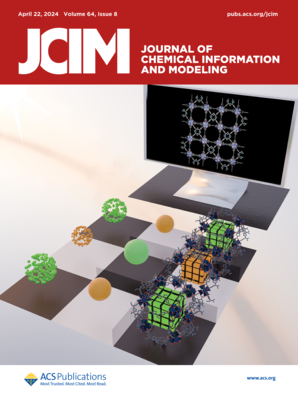Thermal Titration Molecular Dynamics: The Revenge of the Fragments.
IF 5.6
2区 化学
Q1 CHEMISTRY, MEDICINAL
引用次数: 0
Abstract
During the last 20 years, the fragment-based drug discovery approach gained popularity in both industrial and academic settings due to its efficient exploration of the chemical space. This bottom-up approach relies on identifying high-efficiency small ligands (fragments) that bind to a target binding site and then rationally evolve them into mature druglike compounds. To achieve such a task, researchers rely on accurate information about the ligand binding mode, usually obtained through experimental techniques, such as X-ray crystallography or computer simulations. However, the physicochemical characteristics of fragments limit the accuracy and reliability of computational predictions of their binding mode. This article presents a new Thermal Titration Molecular Dynamics (TTMD) protocol, a recently developed enhanced sampling method for qualitatively estimating protein-ligand-binding stability, specifically tuned for the refinement of fragment docking results. The protocol has been applied to eight pharmaceutically relevant targets on 12 different test cases, including ligands with very low molecular weight and structural complexity (MiniFrag/FragLites). In more than 80% of cases, TTMD successfully identified the native fragment binding mode among a set of docking poses, outperforming docking alone and proving to be a useful tool to assist the fragment screening and optimization process.热滴定分子动力学:碎片的复仇。
在过去的20年里,基于片段的药物发现方法由于其对化学空间的有效探索,在工业和学术环境中都得到了普及。这种自下而上的方法依赖于识别与目标结合位点结合的高效小配体(片段),然后合理地将其进化成成熟的类药物化合物。为了完成这项任务,研究人员依赖于关于配体结合模式的准确信息,这些信息通常是通过实验技术获得的,比如x射线晶体学或计算机模拟。然而,碎片的物理化学特性限制了其结合模式计算预测的准确性和可靠性。本文介绍了一种新的热滴定分子动力学(TTMD)方案,这是一种最近开发的用于定性估计蛋白质配体结合稳定性的增强采样方法,专门用于改进片段对接结果。该方案已应用于12个不同测试案例的8个药学相关靶点,包括非常低分子量和结构复杂性的配体(MiniFrag/FragLites)。在超过80%的情况下,TTMD成功识别出一组对接姿势中的原生片段结合模式,优于单独对接,是辅助片段筛选和优化过程的有用工具。
本文章由计算机程序翻译,如有差异,请以英文原文为准。
求助全文
约1分钟内获得全文
求助全文
来源期刊
CiteScore
9.80
自引率
10.70%
发文量
529
审稿时长
1.4 months
期刊介绍:
The Journal of Chemical Information and Modeling publishes papers reporting new methodology and/or important applications in the fields of chemical informatics and molecular modeling. Specific topics include the representation and computer-based searching of chemical databases, molecular modeling, computer-aided molecular design of new materials, catalysts, or ligands, development of new computational methods or efficient algorithms for chemical software, and biopharmaceutical chemistry including analyses of biological activity and other issues related to drug discovery.
Astute chemists, computer scientists, and information specialists look to this monthly’s insightful research studies, programming innovations, and software reviews to keep current with advances in this integral, multidisciplinary field.
As a subscriber you’ll stay abreast of database search systems, use of graph theory in chemical problems, substructure search systems, pattern recognition and clustering, analysis of chemical and physical data, molecular modeling, graphics and natural language interfaces, bibliometric and citation analysis, and synthesis design and reactions databases.

 求助内容:
求助内容: 应助结果提醒方式:
应助结果提醒方式:


